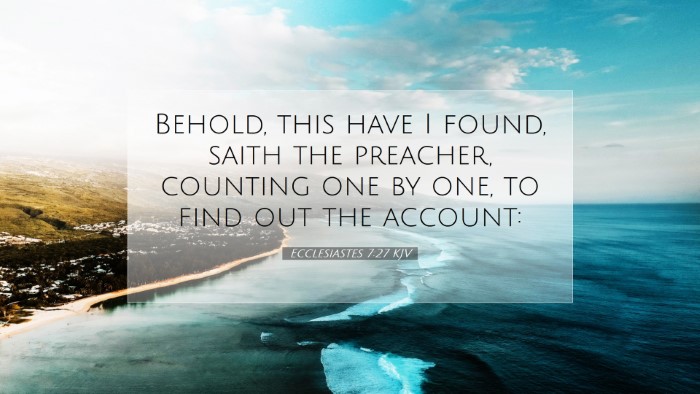Commentary on Ecclesiastes 7:27
Bible Verse: "Behold, this have I found, saith the preacher, counting one by one, to find out the account: which yet my soul seeketh, but I find not: one man among a thousand have I found; but a woman among all those have I not found." (Ecclesiastes 7:27, KJV)
Introduction
The verse in Ecclesiastes 7:27 presents a stark observation by the Preacher (Solomon) regarding the nature of humanity. It encapsulates themes of the search for wisdom, the rarity of uprightness, and the observations of gender dynamics in morality and righteousness. The Preacher expresses his disappointment in the ethical state of men and women, emphasizing the scarcity of virtuous individuals.
Historical Context
The Book of Ecclesiastes is traditionally attributed to Solomon, whose reign is often considered a golden age of wisdom in Israel. As a ruler endowed with profound insight, Solomon embarks on a quest for understanding the purpose of life, ultimately expressing the vanity of worldly pursuits. In the series of proverbs, reflections, and observations throughout the book, he often examines the validity of conventional wisdom and human behavior.
Insights from Public Domain Commentaries
Matthew Henry’s Commentary
Matthew Henry emphasizes that the Preacher’s search is indicative of humanity's quest for understanding the moral state of mankind. He notes:
- The Rarity of Virtue: Henry notes that finding one just man out of a thousand was a profound statement on moral integrity during Solomon's time. This underscores the belief that most people are inclined towards sin rather than righteousness.
- Gender Reflection: The commentary further highlights that while men may occasionally reflect moral goodness, the implication about women may stem from cultural biases of the period. It serves to highlight the need for careful interpretation of gender roles in the text.
- The Quest for the Righteous: Henry suggests that this verse embodies the human experience—the perpetual endeavor to seek a righteous companion, a constant theme through life.
Albert Barnes’ Notes
Albert Barnes approaches the verse with a focus on its philosophical implications, arguing for a deeper introspection regarding humanity:
- Nature of Humanity: Barnes asserts that the observation made by Solomon is not merely a reflection of his time but speaks to the universality of human nature. He views it as a commentary on the fallen state of humanity—where sin pervades.
- Evident Shortcomings: The phrase 'which yet my soul seeketh, but I find not' indicates a persistent search for something unattainable, illustrating the frustrations inherent in the pursuit of excellence.
- Application to Faith: Barnes encourages readers to reflect on how this reality calls for reliance on divine grace and the redemptive work of Christ, who stands in contrast to the disappointing nature surrounding Solomon.
Adam Clarke’s Commentary
Adam Clarke offers a detailed linguistic analysis of the verse, contributing theological reflections:
- Numerical Significance: Clarke points out that the figure 'one among a thousand' could symbolize the overwhelming rarity of finding righteousness, hinting at a deeper message about the expectations of humanity in the light of divine standards.
- Context of Despair: Clarke elaborates on the Preacher's sense of despair in his search, viewing it as a means to highlight God's providence amid human failure. He proposes that this verse serves a dual purpose: revealing the truths about human condition while encouraging a divine perspective.
- Gender Perspective: Clarke discusses the interpretation of 'a woman among all those have I not found.' He cautions against reading this verse simplistically and highlights how the text must be understood in its socio-cultural context.
Theological Reflection
This verse calls believers to reflect on several theological truths:
- The Fallibility of Humanity: The recognition of humanity's moral shortcomings can lead to humility and a more profound reliance on God’s grace.
- The Need for Redemption: Reflecting on the rarity of true virtue reminds individuals of their need for a Savior, as Christ embodies the ultimate righteousness that is completely absent among men.
- Relationships and Community: This search for virtuous companions holds significance for the Christian community, accentuating the importance of accountability and wisdom in relationships.
Conclusion
Ecclesiastes 7:27 presents a sobering view of the moral landscape as observed by Solomon. While it underscores the rarity of integrity, it also invites further exploration of how these truths resonate in the life of believers today. The collective insights of commentaries from Matthew Henry, Albert Barnes, and Adam Clarke offer a rich tapestry of perspectives that not only elucidate the verse but invite ongoing contemplation and application in a faith context.


